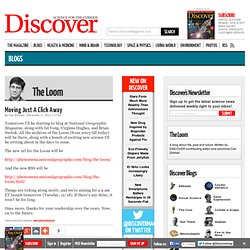

Innovations - How human ingenuity is changing the way we live. The Loom. Your hands are, roughly speaking, 360 million years old.

Before then, they were fins, which your fishy ancestors used to swim through oceans and rivers. Once those fins sprouted digits, they could propel your salamander-like ancestors across dry land. Fast forward 300 million years, and your hands had become fine-tuned for manipulations: your lemur-like ancestors used them to grab leaves and open up fruits. Within the past few million years, your hominin ancestors had fairly human hands, which they used to fashion tools for digging up tubers, butchering carcasses, and laying the groundwork for our global dominance today. We know a fair amount about the transition from fins to hands thanks to the moderately mad obsession of paleontologists, who venture to inhospitable places around the Arctic where the best fossils from that period of our evolution are buried.
The intersection of physics, optics, history and pulp fiction. Science - News for Your Neurons. La Aventura de la Ciencia. Enchufa2. Microsiervos. La ciencia es bella. MalaCiencia. Fogonazos. Tecnología Obsoleta - Weblog personal de Alejandro Polanco Masa. Latest science news articles. Proyecto Sandia. La ciencia de tu vida. La Ciencia por Gusto. Hablando de Ciencia. Durante la organización de Desgranando Ciencia, mis compañeros me pidieron que me encargara de moderar la sesión titulada Medicina del Futuro.

Inicialmente pensé en rechazar el encargo pues no me gusta nada ser el centro de atención. Creo que lo conseguí, me refiero a lo de no destacar, pues debo salir en tres de las “cienes y cienes” (póngase acento granadino) de fotos que se hicieron durante el evento. Luego lo pensé mejor y accedí, se trataba de arrimar el hombro y, además, el centro de la atención serían los ponentes. Esta sesión incluía 4 charlas breves, de 10 minutos cada una, más un debate posterior de 20 minutos: “¿Cómo un el pez cebra puede ayudarnos a encontrar nuevos medicamentos?”